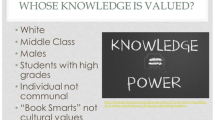
Overview
- Establishes and contrasts the concepts of "critical social justice" and "white justice as fairness" in order to examine the public commemoration of Minnesota's US-Dakota War of 1862
- Explores issues students faced while encountering a regional "white public pedagogy"
- Includes interviews, field notes, and course artifacts
Access this book
Tax calculation will be finalised at checkout
Other ways to access
About this book
This book explores tensions between critical social justice and what the author terms white justice as fairness in public commemoration of Minnesota’s US-Dakota War of 1862. First, the book examines a regional white public pedagogy demanding “objectivity” and “balance” in teaching-and-learning activities with the purpose of promoting fairness toward white settlers and the extermination campaign they once carried out against Dakota people. The book then explores the dilemmas this public pedagogy created for a group of majority-white college students co-authoring a traveling museum exhibit on the war during its 2012 sesquicentennial. Through close analyses of interviews, field notes, and course artifacts, this volume unpacks the racial politics that drive white justice as fairness, revealing a myriad of ways this common sense of justice resists critical social justice education, foremost by teaching citizens to suspend moral judgment toward symbolicwhite ancestors and their role in a history of genocide.
Similar content being viewed by others
Keywords
Table of contents (10 chapters)
-
Front Matter
-
Back Matter
Reviews
“This book takes up the recent call to clearly explicate the ways in which public pedagogies actually work. Lybeck provides a clear analysis of how White public pedagogies operate by presenting excellent data, including observations in classrooms, interviews with students, letters to the editor, public speeches, and more, to show how particular White points of view come to be seen as natural and normal, and how they continue to perpetuate systems of White privilege.”
—Jennifer A. Sandlin, Professor, Department of Justice and Social Inquiry, School of Transformation, Arizona State University, USA
—James Paul Gee, Mary Lou Fulton Professor of Literacy Studies and Regents’ Professor, Arizona State University, USA
“How does one develop an appropriate and effective pedagogy of the privileged, one that would educate white American students into recognizing their country’s white-supremacist history and motivating them to help bring about a racially just nation in the future? Lybeck’s detailed and compelling account of his efforts to challenge conventional Minnesota white-settler framings of the 1862 U.S.-Dakota War provides both a sobering realization of the multiple obstacles to such an undertaking and a valuable and inspirational guidebook, nonetheless, from which educators across the country can learn and continue striving for that laudable goal.”
—Charles Mills, Distinguished Professor of Philosophy, Graduate Center at the City University of New York (CUNY), USA
“This is a painful, brilliant account of yet another ugly chapter in the history of the American genocidal treatment of Native Americans. Lybeck’s critical pedagogy calls for a critique of the practices that keep the violent past alive. A must read.”
—Norman K. Denzin, Professor Emeritus of Sociology and Research Professor Emeritus of Media and Cinema Studies, University of Illinois, USA
“Lybeck’s grain of sand is a short, month-long college course on the US-Dakota War of 1862. And he helps us see the world in it—including how, in classroom and white-settler public pedagogies, the war against Indigenous peoples continues under the banners of neutrality, objectivity, fairness, and balance. Lybeck’s book is startling for its intellectual and moral clarity. Please read it.”
—Timothy J. Lensmire, Professor, Department of Curriculum and Instruction, University of Minnesota, USA, and author of White Folks: Race and Identity in Rural America (2017)
“In a moment when the defense of white supremacy and the attack on teaching truths about injustices andanti-oppressive struggle are blatant and vicious, it might be easy to overlook the subtle, everyday, normalized ways that those happen, both in and out of educational institutions. Lybeck brilliantly and lucidly connects the dots between history, rhetoric, and curriculum as he traces the entrenchment of American nationalism in the genocide of indigenous peoples and the legacy of such contingent identify politics in contemporary debates. It is difficult to imagine a more timely and important intervention than this book as it illuminates the insidious ways that appropriating the commonsensical lexicon of democracy and justice gives force to the public pedagogy of whiteness.”
—Kevin Kumashiro, author of Surrendered: Why Progressives are Losing the Biggest Battles in Education (2020)
Authors and Affiliations
About the author
Rick Lybeck is Assistant Professor of Education in the Department of Teaching and Learning at Minnesota State University, Mankato, USA. His research combines sociocultural theory with methods of critical discourse analysis to explore ways that white American communities teach themselves about their racially violent pasts.
Bibliographic Information
Book Title: Critical Social Justice Education and the Assault on Truth in White Public Pedagogy
Book Subtitle: The US-Dakota War Re-Examined
Authors: Rick Lybeck
DOI: https://doi.org/10.1007/978-3-030-62486-6
Publisher: Palgrave Macmillan Cham
eBook Packages: Education, Education (R0)
Copyright Information: The Editor(s) (if applicable) and The Author(s), under exclusive license to Springer Nature Switzerland AG 2020
Hardcover ISBN: 978-3-030-62485-9Published: 11 December 2020
Softcover ISBN: 978-3-030-62488-0Published: 12 December 2021
eBook ISBN: 978-3-030-62486-6Published: 10 December 2020
Edition Number: 1
Number of Pages: XXVIII, 304
Number of Illustrations: 7 b/w illustrations, 17 illustrations in colour
Topics: Curriculum Studies, History of Education, Sociology of Education, Education, general



